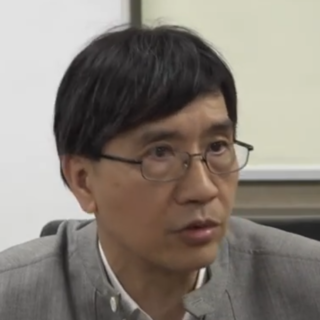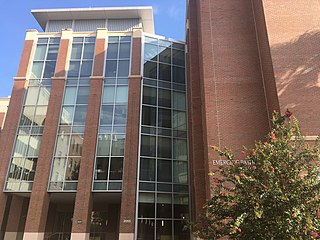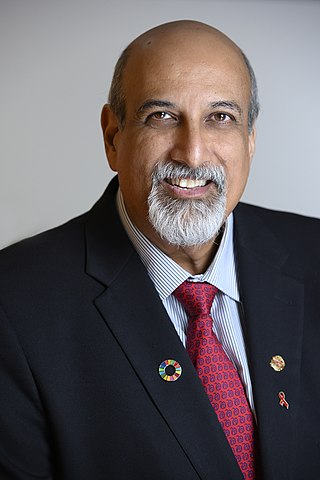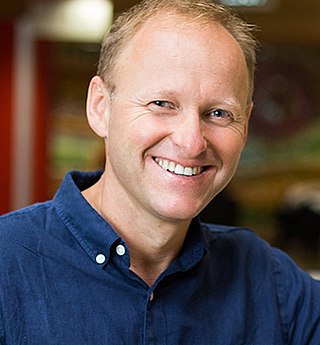
The University of KwaZulu-Natal is a university with five campuses in the province of KwaZulu-Natal in South Africa. It was formed on 1 January 2004 after the merger between the University of Natal and the University of Durban-Westville.

Yuen Kwok-yung is a Hong Kong microbiologist, physician and surgeon. He is a prolific researcher, with most of his nearly 800 papers related to research on novel microbes or emerging infectious diseases. He led a team identifying the SARS coronavirus that caused the SARS pandemic of 2003–4, and traced its genetic origins to wild bats. During the ongoing COVID-19 pandemic, he has acted as expert adviser to the Hong Kong government.
Alan Walter Whiteside OBE is a South African academic, researcher and professor at the Balsillie School of International Affairs and professor emeritus at the University of KwaZulu-Natal. He is well known for his innovative work in the field of the social impacts of HIV and AIDS.

The Emerging Pathogens Institute (EPI) is an interdisciplinary research institution associated with the University of Florida. The institute focuses on fusing key disciplines to develop outreach, education, and research capabilities designed to preserve the region's health and economy, as well as to prevent or contain new and re-emerging diseases. Researchers within the institute work in more than 30 different countries around the world, with over 250 affiliated faculty members stemming from 11 University of Florida colleges, centers, and institutes. The 90,000-square-foot building includes laboratories and collaborative space for bioinformatics and mathematical modeling.
Christopher Mores is an American (US) arbovirologist, trained in infectious disease epidemiology. He is a professor in the Department of Global Health at the Milken Institute School of Public Health, the program director for the Global Health Epidemiology and Disease Control MPH program, and is director of a high-containment research laboratory at the George Washington University in Washington, DC.

Salim S. Abdool Karim, MBChB, MMed, MS(Epi), FFPHM, FFPath (Virol), DipData, PhD, DSc(hc), FRS is a South African public health physician, epidemiologist and virologist who has played a leading role in the AIDS and COVID-19 pandemic. His scientific contributions have impacted the landscape of HIV prevention and treatment, saving thousands of lives.

Tanja Stadler is a mathematician and professor of computational evolution at the Swiss Federal Institute of Technology. She’s the current president of the Swiss Scientific Advisory Panel COVID-19.

The Beta variant, (B.1.351), was a variant of SARS-CoV-2, the virus that causes COVID-19. One of several SARS-CoV-2 variants initially believed to be of particular importance, it was first detected in the Nelson Mandela Bay metropolitan area of the Eastern Cape province of South Africa in October 2020, which was reported by the country's health department on 18 December 2020. Phylogeographic analysis suggests this variant emerged in the Nelson Mandela Bay area in July or August 2020.

There are many variants of severe acute respiratory syndrome coronavirus 2 (SARS-CoV-2), the virus that causes coronavirus disease 2019 (COVID-19). Some are believed, or have been stated, to be of particular importance due to their potential for increased transmissibility, increased virulence, or reduced effectiveness of vaccines against them. These variants contribute to the continuation of the COVID-19 pandemic.
Nextstrain is a collaboration between researchers in Seattle, United States and Basel, Switzerland which provides a collection of open-source tools for visualising the genetics behind the spread of viral outbreaks.

The term variant of concern (VOC) for SARS-CoV-2, which causes COVID-19, is a category used for variants of the virus where mutations in their spike protein receptor binding domain (RBD) substantially increase binding affinity in RBD-hACE2 complex, while also being linked to rapid spread in human populations.

Alex Sigal is a South Africa–based virologist at the Africa Health Research Institute (AHRI) in Durban, South Africa, Max Planck Institute for Infection Biology in Berlin, and University of KwaZulu-Natal in Durban. His work concentrates on evolution and persistence of the SARS-CoV-2 virus. His laboratory was the first to isolate the live B.1.351 (Beta) variant of SARS-CoV-2 first detected in South Africa. Sigal’s laboratory was also the first to report results on the ability of the Omicron variant to escape antibody neutralization in individuals who had two doses of the Pfizer BNT162b2 vaccine as well as from previous infections, with results also suggesting that vaccination combined with a booster or previous infection can offer protection from symptomatic infection with Omicron.

Omicron (B.1.1.529) is a variant of SARS-CoV-2 first reported to the World Health Organization (WHO) by the Network for Genomics Surveillance in South Africa on 24 November 2021. It was first detected in Botswana and has spread to become the predominant variant in circulation around the world. Following the original B.1.1.529 variant, several subvariants of Omicron have emerged including: BA.1, BA.2, BA.3, BA.4, and BA.5. Since October 2022, two subvariants of BA.5 called BQ.1 and BQ.1.1 have emerged.

This timeline of the SARS-CoV-2 Omicron variant is a dynamic list, and as such may never satisfy criteria of completeness. Some events may only be fully understood and/or discovered in retrospect.
Penelope Moore is a virologist and DST/NRF South African Research Chair of Virus-Host Dynamics at the University of the Witwatersrand in Johannesburg, South Africa and Senior Scientist at the National Institute for Communicable Diseases.
Sikhulile Moyo is a Zimbabwean virologist working as the laboratory director of the Botswana–Harvard AIDS Institute Partnership and a research associate at the Harvard T.H. Chan School of Public Health. In November 2021, Moyo and his laboratory were the first to identify the SARS-CoV-2 Omicron variant. In 2022, Moyo was listed in the Time 100 list.
Leondios G. Kostrikis is a Cypriot biochemist and scientist from Cyprus and a Professor of Biological Sciences at the University of Cyprus.
This article is about the timeline of events during the COVID-19 pandemic in South Africa which was part of the ongoing pandemic of coronavirus disease 2019 (COVID-19) that was first recorded in South Africa on 1 March 2020. Since that date the pandemic has hit the country in four waves.

Sunit Kumar Singh is an Indian molecular virologist and professor of Molecular Immunology & Virology at the Institute of Medical Sciences, Banaras Hindu University. Currently he is the director of the Dr B R Ambedkar Center for Biomedical Research (ACBR), New Delhi.
Francesco PetruccioneAAS,ASSAf is a physicist and academic leader currently serving as a professor of Physics at Stellenbosch University and the interim director of the National Institute for Theoretical and Computational Sciences (NITheCS). With a wealth of experience in his field, he previously held the position of professor and Pro Vice-Chancellor of Big Data and Informatics at the University of KwaZulu-Natal (UKZN). Petruccione is also a member of the Academy of Science of South Africa and a Fellow of the Royal Society of South Africa.









